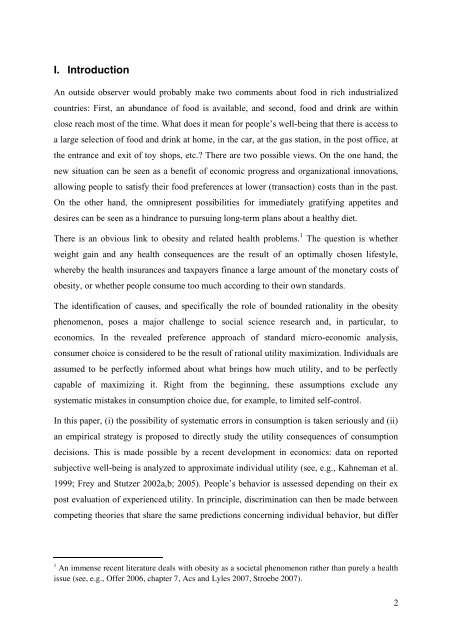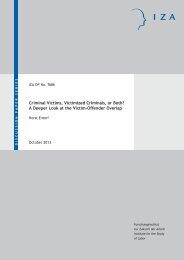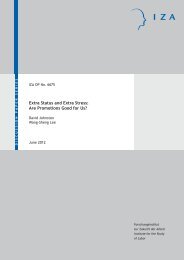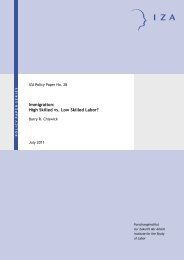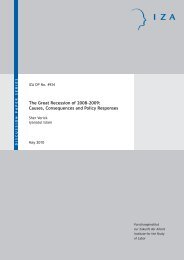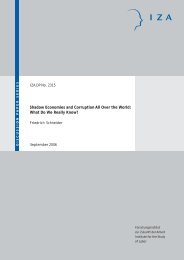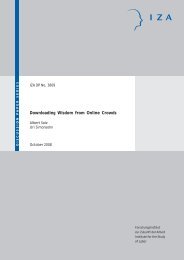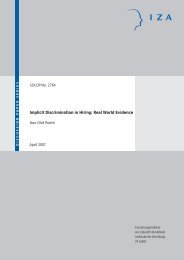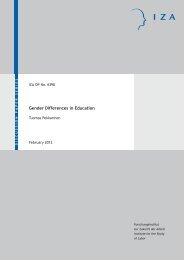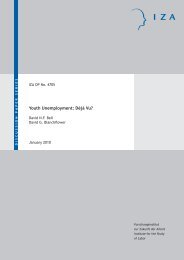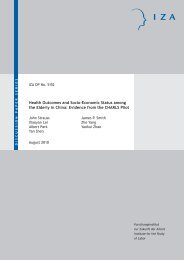Limited Self-Control, Obesity and the Loss of ... - Index of - IZA
Limited Self-Control, Obesity and the Loss of ... - Index of - IZA
Limited Self-Control, Obesity and the Loss of ... - Index of - IZA
Create successful ePaper yourself
Turn your PDF publications into a flip-book with our unique Google optimized e-Paper software.
I. Introduction<br />
An outside observer would probably make two comments about food in rich industrialized<br />
countries: First, an abundance <strong>of</strong> food is available, <strong>and</strong> second, food <strong>and</strong> drink are within<br />
close reach most <strong>of</strong> <strong>the</strong> time. What does it mean for people’s well-being that <strong>the</strong>re is access to<br />
a large selection <strong>of</strong> food <strong>and</strong> drink at home, in <strong>the</strong> car, at <strong>the</strong> gas station, in <strong>the</strong> post <strong>of</strong>fice, at<br />
<strong>the</strong> entrance <strong>and</strong> exit <strong>of</strong> toy shops, etc.? There are two possible views. On <strong>the</strong> one h<strong>and</strong>, <strong>the</strong><br />
new situation can be seen as a benefit <strong>of</strong> economic progress <strong>and</strong> organizational innovations,<br />
allowing people to satisfy <strong>the</strong>ir food preferences at lower (transaction) costs than in <strong>the</strong> past.<br />
On <strong>the</strong> o<strong>the</strong>r h<strong>and</strong>, <strong>the</strong> omnipresent possibilities for immediately gratifying appetites <strong>and</strong><br />
desires can be seen as a hindrance to pursuing long-term plans about a healthy diet.<br />
There is an obvious link to obesity <strong>and</strong> related health problems. 1 The question is whe<strong>the</strong>r<br />
weight gain <strong>and</strong> any health consequences are <strong>the</strong> result <strong>of</strong> an optimally chosen lifestyle,<br />
whereby <strong>the</strong> health insurances <strong>and</strong> taxpayers finance a large amount <strong>of</strong> <strong>the</strong> monetary costs <strong>of</strong><br />
obesity, or whe<strong>the</strong>r people consume too much according to <strong>the</strong>ir own st<strong>and</strong>ards.<br />
The identification <strong>of</strong> causes, <strong>and</strong> specifically <strong>the</strong> role <strong>of</strong> bounded rationality in <strong>the</strong> obesity<br />
phenomenon, poses a major challenge to social science research <strong>and</strong>, in particular, to<br />
economics. In <strong>the</strong> revealed preference approach <strong>of</strong> st<strong>and</strong>ard micro-economic analysis,<br />
consumer choice is considered to be <strong>the</strong> result <strong>of</strong> rational utility maximization. Individuals are<br />
assumed to be perfectly informed about what brings how much utility, <strong>and</strong> to be perfectly<br />
capable <strong>of</strong> maximizing it. Right from <strong>the</strong> beginning, <strong>the</strong>se assumptions exclude any<br />
systematic mistakes in consumption choice due, for example, to limited self-control.<br />
In this paper, (i) <strong>the</strong> possibility <strong>of</strong> systematic errors in consumption is taken seriously <strong>and</strong> (ii)<br />
an empirical strategy is proposed to directly study <strong>the</strong> utility consequences <strong>of</strong> consumption<br />
decisions. This is made possible by a recent development in economics: data on reported<br />
subjective well-being is analyzed to approximate individual utility (see, e.g., Kahneman et al.<br />
1999; Frey <strong>and</strong> Stutzer 2002a,b; 2005). People’s behavior is assessed depending on <strong>the</strong>ir ex<br />
post evaluation <strong>of</strong> experienced utility. In principle, discrimination can <strong>the</strong>n be made between<br />
competing <strong>the</strong>ories that share <strong>the</strong> same predictions concerning individual behavior, but differ<br />
1 An immense recent literature deals with obesity as a societal phenomenon ra<strong>the</strong>r than purely a health<br />
issue (see, e.g., Offer 2006, chapter 7, Acs <strong>and</strong> Lyles 2007, Stroebe 2007).<br />
2


